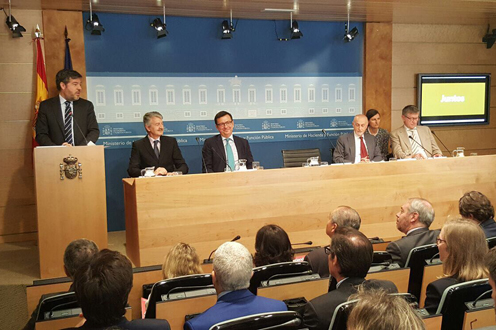European Structural and Investment Funds 2014-2020
SME Initiative has offered 3 billion euros of finance to small- and medium-sized enterprises in Spain
News - 2017.5.24
At an event attended by the State Secretary for Budgets and Expenditure, Alberto Nadal, the Vice-President of the European Investment Bank (EIB), Román Escolano, the Chief Executive of the European Investment Fund (EIF), Pier Luigi Gilbert, and the Director for Smart and Sustainable Growth and Spain Manager of the European Commission, Rudolf Niessler, as well as representatives from all regional governments and the nine financial entities supporting the programme, the possibility was also announced of increasing the allocation with additional resources for this financial instrument that offers access to bank loans under advantageous terms and conditions.
Spain was the first EU country to implement this line of guarantees after agreements were signed between the Ministry of the Treasury and Public Function and the EIB Group in February 2015. It is worth noting the important and decisive role played by the regional governments by providing resources from the European Regional Development Fund (ERDF) through their respective Operational Programmes. Hence, the 800 million euros from the ERDF provided for this instrument by both the General State Administration Services of Spain and the regional governments, together with the support from the EIB Group by assuming risks up to an amount of approximately 2 billion euros, have enabled loans worth over 3.2 billion euros to be mobilised and 35,000 SMEs to receive finance in only 15 months, providing work to some 325,000 people. The SME Initiative has a maximum loan mobilisation potential of 5.5 billion euros and seeks to benefit 40,000 companies.
The SME Initiative is a management instrument centralised by the EIB Group, which takes shape through financial entities selected on a public competition basis. Nine entities have joined the programme to date: Bankia, Banco de Santander, CaixaBank, Banco Popular Español, Banco Sabadell, Bankinter, Grupo Caja Rural, Liberbank and Ibercaja.
One of the most significant results of this instrument is that it is reaching SMEs of a smaller size and in all economic sectors, which is highly important given the nature of the Spanish business fabric. To date, 77% of the companies benefiting from the SME Initiative in Spain have less than 10 employees and 96% have less than 50. The average amount of the loans issued is 76,000 euros. Support is also being provided to entrepreneurship, reflected in the fact that many of these SMEs (38%) are start-ups under three years old.
At the presentation event, the State Secretary for Budgets and Expenditure, Alberto Nadal, said that application of a portion of the ERDF Funds as a guarantee for new loans to SMEs is making it easier for them to access financing, reducing requirements, and improving the terms and conditions of their loans. He went on to add that the SME Initiative enables a knock-on effect from the ERDF financing because it attracts private funds, "meaning that, given the excellent results being achieved by the initiative, we are studying with the European Commission and the EIB Group the possibility of increasing the allocation with additional resources".
In turn, the Vice-President of the EIB, Román Escolano, stressed that support for SMEs is essential for economic growth in Spain because they are the basic vehicles for wealth and job creation. "The excellent uptake of this initiative in Spain is making it possible for thousands of Spanish companies to start enjoying increased liquidity for their investments under advantageous financing conditions, which enables them to be more competitive and access more resources, thereby benefiting the entire Spanish economy and facilitating job creation", he said.
In terms of the results in Spain, the Chief Executive of the EIF, Pier Luigi Gilibert, underlined the achievements made by Spain in implementing the SME Initiative. "We are very proud of the results", he said, while also recalling that 96% of the contribution of 800 million euros from European Structural and Investment Funds has been used in only 15 months under agreements between the EIF and nine Spanish banks. "The SME Initiative is making it easier for companies to access finance, promoting activity and supporting their investment projects", he said.
The Director for Smart and Sustainable Growth and Spain Manager of the European Commission, Rudolf Niessler, stressed that "the SME Initiative stands as a successful example of how the ERDF can support growth by the Spanish economy and job creation. Thanks to a combination with other funds and its repayable nature, it has achieved a major knock-on effect and facilitated access to finance for over 35,000 SMEs, which in many cases are for new investment projects. Other European countries are currently developing similar actions based on the Spanish model", he said.
More financing for Spanish companies
The SME Initiative combines ERDF funds with contributions from Horizonte 2020 and support from the EIB Group. It functions as follows: each participating company requests a loan from its bank, which is 50% guaranteed by the fund created by the SME Initiative. This means that, rather than being issued as a classic subsidy, the ERDF funds constitute a guarantee that reduces the risk assumed by the financial entities, which makes it easier for companies to access credit under better conditions. It also creates a knock-on effect estimated to be at least four times the ERDF contribution from each one of the participating regions in loans to SMEs within their territories.
Spanish companies with less than 250 employees in need of financing for projects to be undertaken within Spain are eligible to apply for these loans. The SMEs must meet one of two requirements: have a turnover less than or equal to 50 million euros; or have a maximum balance sheet of 43 million euros.





